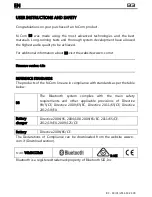
146
5. Driving guide
-
Frosting or fogging of front windshield
due to temperature difference or frost
in low-temperature and alpine areas,
which will obstruct the IFC sensor, and
cause display of following telltales on
the instrument cluster: “The working
conditions of the cruise control system are
not met” or “MRR is blocked”. The ACC
system and FCM cannot function at this
time.
8. Brake overheating. If the brake is
overheated due to emergency braking or
driving down a steep slope, ACC will be
deactivated automatically, and meanwhile
the instrument cluster will display a tell-
tale reading “The working conditions of the
cruise control system are not met”. After
that, ACC can no longer be activated.
ACC can only be reactivated when the
brake temperature drops to a reasonable
degree.
9. It is not recommended to use the ACC
under the situation of urban traffic
congestion or poor visibility (night driving/
backlighting/rain/snow/dense fog, etc.).
ACC may not take braking measures
in face of people, animals, narrow
vehicles such as bicycles, motorcycles
or electromobiles, low-bed trailers,
approaching or stationary vehicles, and
low-speed or stationary trucks/small
pickup trucks, so the driver should be
particularly alert and always be ready to
take over the vehicle.
WARNING
● The ACC cannot address all driving
scenarios and traffic, weather and
road conditions.
● ACC function is only a supplementary
driving assistance function. Even if
used, this function cannot replace
your attention and judgment. It is
your responsibility to maintain a safe
distance and speed, and, if the ACC
fails to maintain a proper speed or
a proper distance from the vehicle
ahead, you must take over the ACC.
● The hands-on reminder of ACC only
warns the driver of vehicles detected
by its radar and IFC sensor, so ACC
may not send an alarm, or may send
an alarm after a certain delay. Never
wait for an alarm to be given and
step on the brake when the situation
requires.
















































